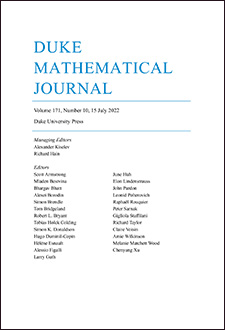Abstract
Let be a complex, linear algebraic group acting on an algebraic space . The purpose of this article is to prove a Riemann-Roch theorem (Theorem 6.5) that gives a description of the completion of the equivariant Grothendieck group at any maximal ideal of the representation ring in terms of equivariant cycles. The main new technique for proving this theorem is our nonabelian completion theorem (Theorem 5.3) for equivariant -theory. Theorem 5.3 generalizes the classical localization theorems for diagonalizable group actions to arbitrary groups
Citation
Dan Edidin. William Graham. "Algebraic cycles and completions of equivariant -theory." Duke Math. J. 144 (3) 489 - 524, 15 September 2008. https://doi.org/10.1215/00127094-2008-042
Information





